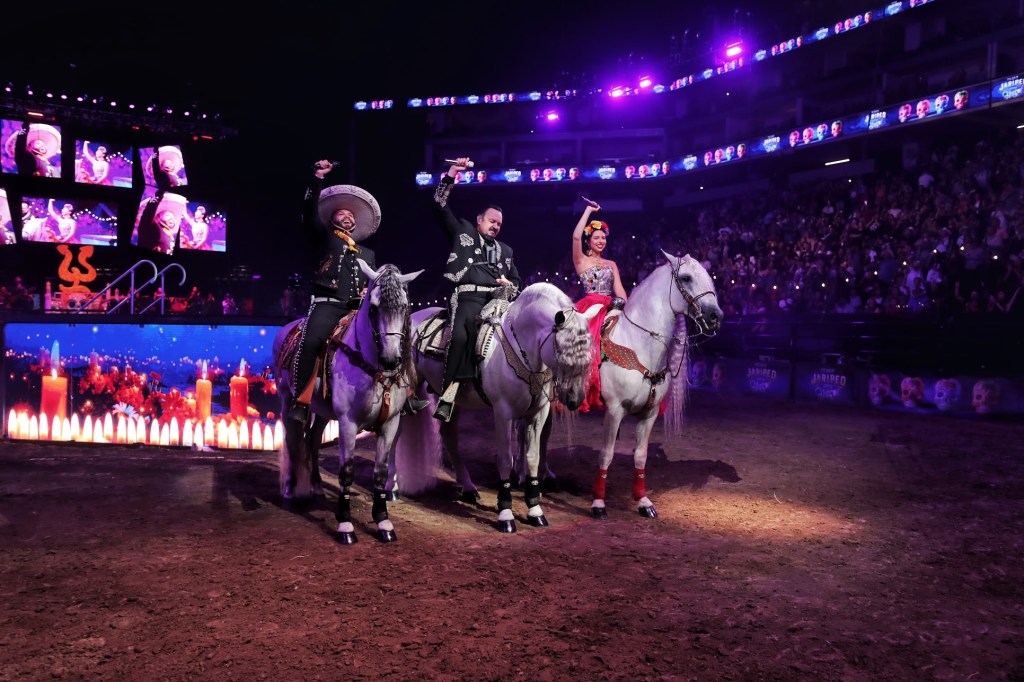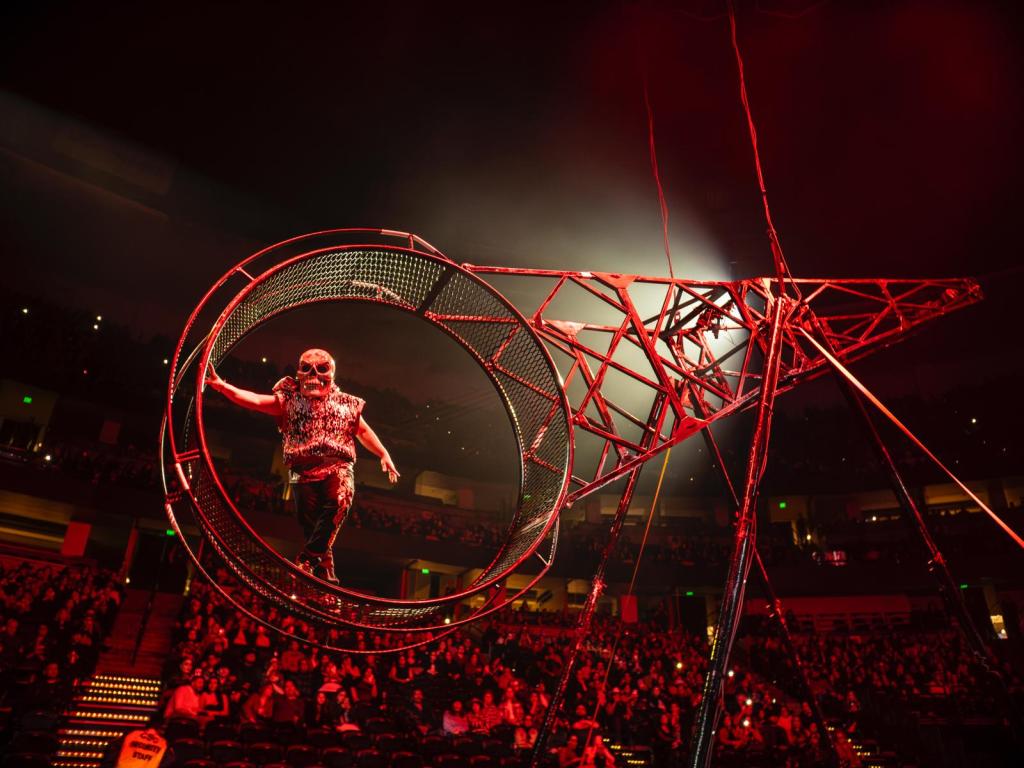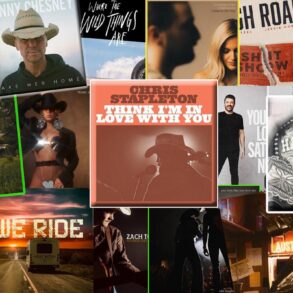Mexican actor and singer Antonio Aguilar was already performing in Hollywood when, in 1960, he forged one of the greatest unions of Southern California entertainment families by marrying singer and actress Flor Silvestre. Aguilar, with credits in American western films like “The Undefeated” starring John Wayne, and Silvestre, a leading star of the “golden age” of the Mexican film industry, raised their children on the road while the couple delivered a first-of-its-kind equestrian sports and music show – la charrería or jaripeo – across international stages.
Sixty years later, their son, Pepe Aguilar – a four-time Grammy winner with over 13 million albums sold – is at the helm of the family’s next generation of stars: Pepe’s children, 24 year-old Leonardo and 20 year-old Angela, along with Pepe’s brother Antonio Jr., are currently on the U.S. leg of their updated jaripeo tour that incorporate theatrics, circus tricks, artificial intelligence, operatic performances on horseback on a 360-degree-style stage.
And that’s just the tip of the iceberg: Angela sells her own perfume and doll, and Pepe is currently working and actively pitching scripted television series (more on that later). Pepe, who just recently released his “Que Llueva Tequila” album, has no plans of slowing down.
Popular on Variety

Courtesy Image
After suing his first label over ownership of his masters and publishing rights in the 2000, Pepe released music as an independent artist and went on to launch his own labels Machín Records and Equinoccio Records. Working under a (recently) signed worldwide agreement with Virgin Music Group, Universal Music Group’s services and distribution division, Pepe has complete ownership of his masters. He is also spearheading the careers of his children, both of whom are signed to his labels, along with accordionist Irany Divad, who was a part of Karol G’s band for her massive “Mañana Será Bonito” stadium tour.
The family is used to sharing each other’s resources, but as his kids get older, Pepe is cognizant of a looming evolution of the Aguilar family. While Pepe returned to his rock roots for his new 13-song LP, blending his traditional mariachi with edgy guitars, his children found new audiences in the United States with successful collaborations – including “Por El Contrario” with Becky G. Angela also became a Grammy nominated artist in 2018 for her “Primero Soy Mexicana” album.
“When it comes to the industry, there’s a lot we have to think about now that I didn’t necessarily have to deal with when I was first developing as an artist,” Pepe tells Variety. “My father and I were tremendously different when it came to doing business, but he always encouraged me to have a grasp of what the big picture was: This is not just a family affair – this is a business.”
Below, Pepe gives insight to the future of his million-dollar catalog, pulls back the curtain on his past and future business deals, and offers his thoughts on música mexicana’s place at the 2024 Latin Grammys.
You are probably one of the only successful mariachi artists who has been willing to evolve the genre, not just sonically, but in the way you present the music on tour. How intentional is that approach to your business?
I wasn’t planning on doing something like this – the fusion of mariachi and rock, and our presentation of the show visually does reflect the growth of the genre in today’s standards. But this fusion has existed in me forever – from the lyrics to the harmonies and orchestration. The group of instruments that informs mariachi is very unique. You can almost do whatever you want with them, so it’s in constant evolution – even if people are quick to think of it as an “age-old” style.
I think that mariachi will stay very traditional, and traditional mariachi will never die. But it’s like classical music in the sense that it will evolve.

Courtesy Image
You were in a rock band called Equs in your early adulthood– was your father supportive of your desire to branch out?
My father wasn’t supportive, but he also wasn’t an obstacle. He just said, “Son, I don’t think it’s going to be good for you.” And he was right on that one – and many, many other ones.
Was he as much of an obstacle when it came to making the decision to go independent, and to sue Musart (a division of Concord Music Group)?
I had no idea how hard it would be to sue a label when I decided to pull that trigger. But I’ve always been one to fight for what’s right, and when you start selling millions and you keep on getting, like, 3% or 5% of everything – that’s a red flag. And it should be a red flag for all artists at any stage of their career, but that was the system at the time. So maybe it was a thing of my generation, different from my father’s and my mother’s. Maybe they were focused on something else, or they were only focused on doing live shows. But I saw entertainment as a universe of opportunities, and the company I was with wasn’t doing business in a fair way.
I’m 55 and that first lawsuit was when I was maybe 23, because I signed at 19.
What is your ultimate goal for the labels – Machín and Equinoccio Records?
Globalization. It’s an inevitable outcome. We need to be present internationally. That’s it.
It’s not easy because it’s something that needs to be done in conjunction with our partners (Virgin Music Group), and there’s a lot of bases that are still left to hit, and it’s a plan that will involve an expanded network. There’s still much to do but I’m not complaining – I’m just saying that it’s a little harder than I thought, and not because of the quality of the music or the artist, but because if you’re going to do something, you need to do it with time on your side. We’re planning expansions to take the tour and music to Colombia, we’re doing some shows at huge arenas, and plotting in Chile, Spain, the States and Mexico, which is our natural market.
Are you in the market for new artists? What is your approach to the artists you have now – Leonardo, Angela and Irany Divad?
We’re always in the market for new talent, new artists, new concepts. But we are a boutique label for a reason, and there is a long list of criteria.
Irany’s working on her new album, which I’m certain is going to surprise a lot of people. These artists are growing devoted followers, and it’s translating in the numbers because we are competing with the big labels on the nominations, on the charts, the streaming, the views. There are thousands of ways to play this game, and all of our artists have the promotion game right – it’s just about capturing and capitalizing on what works for each specific one.
Your children are under your label – how do you go about maneuvering family and business?
They are very well informed. Sometimes, because of the things we sign and we do, they even get counseling from other people, because I make them get counseling from third parties. It’s not that they think I’m swindling them, obviously, but they are the main proprietors of their music business. That’s the way that we do business here, as a family, and it has worked perfectly well for everybody. They have the best contracts in the industry, but it’s up to them to navigate how they choose to maneuver and invest in their careers.
There has been a media frenzy revolving around your daughter’s relationship with another major Latin artist, Christian Nodal. The headlines are ruthless. Are you advising her on navigating the public narrative?
To tell you the truth, the media thing? I don’t follow it. I trust her decisions and I love my daughter, I want the best for her. She probably sees things in a different way that I see them. But I am not worried about her and I don’t think she’s too caught up with it either. I think that she is a human being, and she knows that, as a public figure, she’s being watched. I will respect whatever she chooses to do regarding the media frenzy but in general, I really don’t care.
The Latin Grammys recently added the Best Contemporary Mexican Music Album category. What are your thoughts on that?
They responded to the demand for recognition, and to be honest, I think the Academy has been accurately addressing the expansion of the genre – which is sounding completely different from one month to the next, so that in itself is an impressive accomplishment.
You have recorded over 20 albums in your lifetime – have you looked into selling portions of your catalog? Do you see that in your future?
It’s a trend I’ve been following. I own all 24 of my masters– something 90% of my peers can’t claim. I am looking at possibilities. I know that my songs stand the test of time enough so that nothing will change their status – even if I don’t have complete creative control over them. I’ll cross that bridge when I get there, but right now is not the time.
I want to keep growing my catalog – at least another 10 albums. After that, maybe I’ll take them up on the offers and go retire on a golf course, but now is not the time.
Outside of music, what other projects are in the works?
We have been working on expanding into television and film for about six to seven years – right before the pandemic, we started taking meetings with the film company Endemol Shine and signed a contract that eventually fell through because of the pandemic.
I’ve been playing around with that idea for quite some time, and I have some projects and some things that interest me a lot that I want to show that I’m working on that has to do with the music, and also that has to do with my family, and others that are not so much focused on telling our story but allow us to follow other plotlines. It’s on its way!
This story appears in Variety’s July 24-dated “Business of Beat Latino” newsletter.







